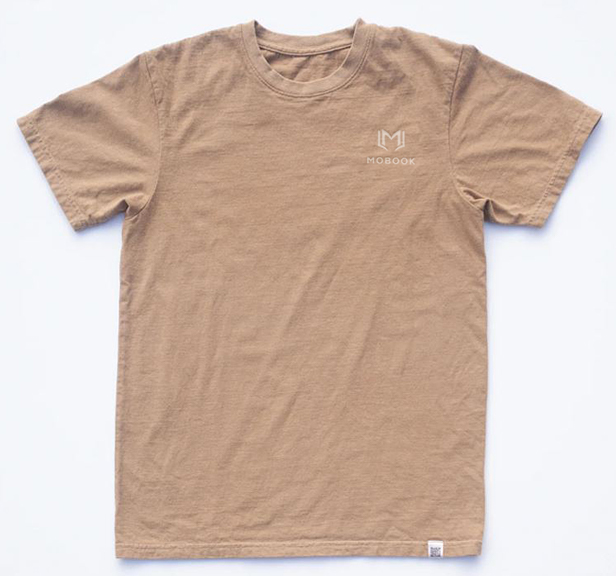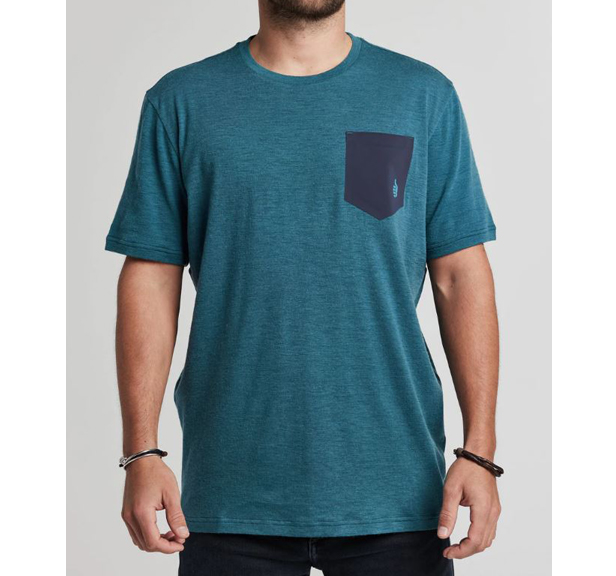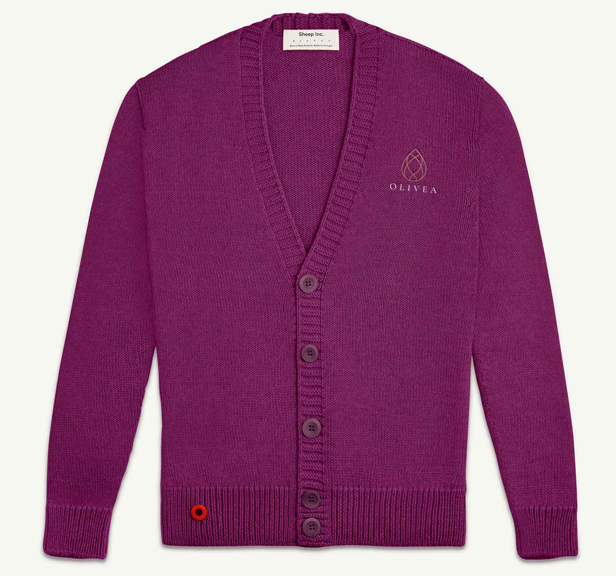Sustainability June 03, 2022
3 Innovations in Sustainable Apparel
Whether it’s plant-based garment dye or a new twist on an age-old textile, many apparel brands are exploring fresh ways to boost the eco power of fashion.
Apparel, particularly when it comes to fast fashion, is notorious for being one of the most polluting industries, whether it’s the sheer volume of textiles that end up in landfills each year or the chemicals and water used in textile dyeing and processing. But people increasingly are demanding something different: According to McKinsey, 66% of consumers consider sustainability when they buy clothes. Here are a few recent innovations from clothing brands that will pique the interest of sustainably minded shoppers.
A Nutty Idea for Natural Tees

TS Designs used locally foraged black walnuts to dye a batch of USA-made tees. (Photo courtesy of Solid State Clothing)
TS Designs, a North Carolina-based apparel company that follows a “dirt to shirt” made-in-the-USA model with a traceable supply chain, took its mission a step further, tinting a batch of its Solid State brand tees with dye made from locally foraged black walnuts.
The company said it collected hundreds of pounds of walnuts that fell from trees near the homes of CEO Eric Henry and North Carolina cotton famer Andrew Burleson. TS Designs partnered with a local brewery, Burlington Beer Works, which cooked the walnuts to create the soft brown dye. TS Designs then dyed the garments at its facility. The dyeing process from “ground to garment” took about 48 hours, according to TS Designs.
A portion of the proceeds from sales of the tees, made of 100% ringspun Carolina cotton, goes to the Croatan Institute’s Canopy Community, to enhance its mission to create an equitable world and resilient economies.
This isn’t the first time TS Designs has experimented with plant-based dyes. The company says it’s used plant matter including pomegranate, fustic and madder to create a range of colors for garment-dyed tees.
A Performance Tee … Made of Wool?

TREW Gear offers a T-shirt made of Nuyarn, a twist-free spinning technology that’s said to unlock the performance qualities of wool. (Photo courtesy of TREW Gear)
TREW Gear, a Portland, OR-based apparel company that makes performance ski and snowboard wear, recently released a collection of tees made of Nuyarn, a patented twist-free spinning technology.
Wool, notes Nuyarn’s website, is a natural performance material – keeping sheep warm in the winter and cool in the summer. “It’s literally a lifesaver and a genuine performance fiber,” according to the site. However, those benefits haven’t really been fully recognized in human apparel. “Traditional spinning twists the life out of wool by compressing natural air pockets, introducing tension, creating loops and restricting the natural movement of the fibers,” according to Nuyarn. This rope-like structure can feel itchy against the skin.
In comparison, Nuyarn doesn’t twist the fibers, instead drafting them to create two-ply yarns with more aeration and volume than traditional production methods, the company notes. In addition, the wool is certified non-mulesed and comes from open-range sheep that are shorn annually. Nuyarn is spun using 30% fewer raw materials than traditional methods.
View this post on Instagram
A Carbon-Negative Cardigan

Sheep Inc. says it crafted its supply chain so that its wool garments actually save more carbon than they emit over their lifetime. (Photo courtesy of Sheep Inc.)
Sheep Inc., a London, UK-based brand that makes long-lasting, biodegradable cardigans, hoodies and sweaters, says its operations save more carbon than they emit. “Our starting point was to understand how you could create beautiful products while still addressing the climate emergency,” Edzard van der Wyck, company co-founder, told Robb Report. “There are so many systemic issues with how things have traditionally been done within fashion.”
The brand says it sources Merino wool from regenerative New Zealand farms then adds a “performance-enhancing, zero-chlorine treatment using solar power.” Each garment Sheep Inc. makes includes something it calls “The Connected Dot,” which uses near-field communication (NFC) technology “to help people connect the dots on where our clothes really come from.”
The NFC tag on the garments is the same tech that the farmers use to keep track of their flock. Once it’s scanned, you’ll be able to see which sheep provided the wool for the garment, plus details of how, when and by whom the knit was created. Sheep Inc. also gives a full breakdown of the CO2 impact of a sweater’s creation, showing how its supply chain approach can “naturally sequester and save CO2 impact at every stage,” according to its website.
A detailed carbon lifecycle report on Sheep Inc.’s website explains that its products are made from wool produced by sheep in New Zealand, cleaned in China and sent to Italy to be spun into yarn. The yarn goes to Portugal where products are made, then is sent to the UK for packaging and distribution. The garments can be composted at the end of a presumed five-year life expectancy. “The majority of emissions are associated with the product distributions, but overall, all the products have a negative carbon footprint due to the wool,” according to the report.
View this post on Instagram

Promo for the Planet is your destination for the latest news, biggest trends and best ideas to help build a more sustainable and socially-responsible industry.
